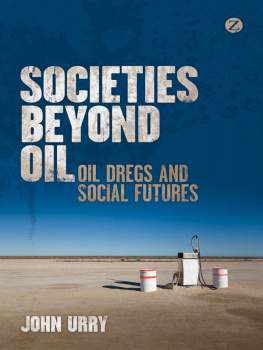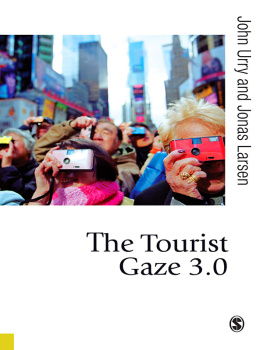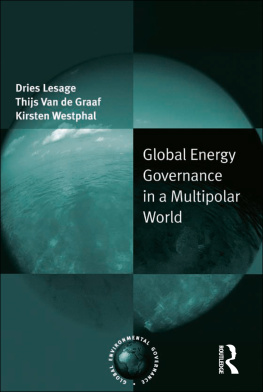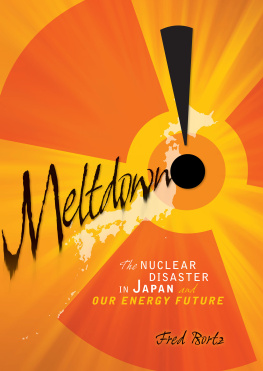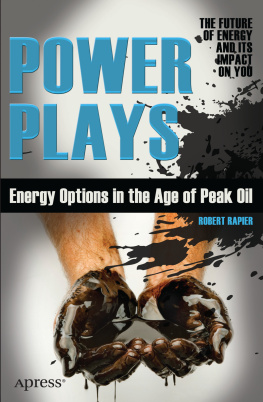
ABOUT THE AUTHOR
JOHN URRY is a Distinguished Professor of Sociology at Lancaster University. Educated at the University of Cambridge (B.A./M.A. Economics, Ph.D. Sociology), he is the editor of the International Library of Sociology, co-editor of Mobilities and director of the Lancaster Centre for Mobilities Research. His recent books include Automobilities (2005), Mobilities, Networks, Geographies (2006), Mobilities (2007), Aeromobilities (2009), After the Car (2009), Mobile Lives (2010), Mobile Methods (2011), The Tourist Gaze 3.0 (2011) and Climate Change and Society (2011).
SOCIETIES BEYOND OIL
Oil Dregs and Social Futures
______________________
JOHN URRY

Zed Books
LONDON | NEW YORK
Societies beyond Oil: Oil Dregs and Social Futures was first published in 2013 by Zed Books Ltd, 7 Cynthia Street, London NI 9JF, UK and Room 400, 175 Fifth Avenue, New York, NY 10010, USA
This ebook edition was first published in 2013.
www.zedbooks.co.uk
Copyright John Urry 2013
The right of John Urry to be identified as the author of this work has been asserted by him in accordance with the Copyright, Designs and Patents Act, 1988
Designed and typeset in Monotype Bembo Book
by illuminati, Grosmont
Index by John Barker
Cover design by www.roguefour.co.uk
Cover image Stockphoto.com/kristaweber
All rights reserved. No part of this publication may be reproduced, stored in a retrieval system or transmitted in any form or by any means, electronic, mechanical, photocopying or otherwise, without the prior permission of Zed Books Ltd.
A catalogue record for this book is available from the British Library Library of Congress Cataloging in Publication Data available
ISBN 978 1 78032 171 4
CONTENTS
ACKNOWLEDGEMENTS
Many colleagues around the world have helped me in developing the ideas and arguments for this book. I am especially grateful for suggestions or collaborations with Andrew Curry, Jrgen-Ole Baerenholdt, Mike Berners Lee, Thomas Birtchnell, Lucy Budd, Monika Bscher, Javier Caletrio, Rachel Cooper, Saolo Cwerner, Tim Dant, Kingsley Dennis, Pennie Drinkall, Anthony Elliott, James Faulconbridge, Bianca Freire-Medeiros, Tony Gatrell, Anthony Giddens, Margaret Grieco, Michael Haldrup, Kevin Hannam, Mark Harvey, Christa Hubers, Michael Hulme, Paola Jiron, Peter Jones, Roger Kemp, Sven Kesselring, Jonas Larsen, Scott Lash, Glenn Lyons, Phil Macnaghten, James Marriott, Cary Monreal Clark, Colin Pooley, Satya Savitzky, Heiko Schmid, Mimi Sheller, Mark Stoddart, Bron Szerszynski, David Tyfield, Tom Urry, Claire Waterton, Brian Wynne, and especially Amy Urry and Sylvia Walby.
I am indebted to the Sociology Department at Lancaster University for much support and encouragement over an exceptionally long time. I am also grateful for inspiration from those groups and experiments that are seeking to innovate what I term here a low carbon civil society.
Lancaster
August 2012
INTRODUCTION
THE PROBLEM OF ENERGY
Energy
Overall how societies are energized is crucial for understanding how they work, how they are powered. This powering of societies depends upon systems of energy production, distribution and consumption. These vary enormously, from muscle power, wood, wind, water and sun to coal, gas, oil, hydroelectric, geothermal and nuclear, from small-scale localized production to huge global systems. Until the eighteenth century energy derived from muscle power (8085 per cent), wind, wood for burning and water. Now the fossil fuels of coal, gas and oil account for over four-fifths of the worlds current energy.
Energy systems are incredibly important. They generate very varied and often highly unequal economic, social and political patterns. Such powering of society often takes a long time to change. And yet if they do change this has huge consequences for economies, cities, inequalities, mobilities, gender relations, foreign policies and levels of income and well-being within and across societies. As energy use became larger and more large scale, so inequalities tended to increase and greater divisions of interest arose between major social groups with regard to their energy production and use.
Energy and its consequences are central to almost all aspects of contemporary life. There is little activity that does not involve substantial energy supplies. The exploitation of energy is moreover doing something that many had thought impossible, namely changing the climate through global warming. There are also huge insecurities in future supplies of energy. There are often many local and global risks involved in the processes through which energy resources are produced, distributed and used. Energy rarely involves a free lunch, although the bill is often paid by those not actually consuming the lunch.
These effects are most pronounced in those energy resources which power tools, buildings, machines and especially mobile-machines. These are responsible for ordering and reordering physical, economic, social and military worlds. Especially significant has been the coal-based steam power that developed in the West during the eighteenth and nineteenth centuries. This set societies, first in Europe and then North America, onto a quite different path of development. Nobel prizewinner Paul Crutzen argues that these innovations initiated a new geological period of human history, the anthropocene. Matthew Boultons first factory and James Watts steam engine were central to this new fateful era beginning in England in the second half of the eighteenth century. James Boswell in 1776 commented on visiting the worlds first factory, owned by Matthew Boulton: I shall never forget Mr Boltons [sic] expression to me: I sell here, Sir, what all the world desires to have POWER.
Coal enabled the production and consumption of various large systems, generating the horsepower of millions of people. Societies came to be organized around new production, transportation and communications, whole new patterns of living. The anthropocene period stemmed from developing immensely powerful systems using coal which remade the world. Coal was the energy resource initiating the anthropocene. This was significant for many reasons but especially for its transformation of human movement.
Prior to the nineteenth century, peoples movement had been slow, by foot, sedan chair, riding an ox or horse, sailboat and carriage. These were all non-mechanical. So although people moved, they did not move fast and their forms of movement did not involve huge transformations of the physical world. The main exception to this was the eighteenth-century building of canals, which pioneered techniques of bridge-building and cuttings subsequently significant in the building of railways during the second half of the nineteenth century, beginning first in Britain.
Railways were especially significant, the first mobile-machines, as they restructured physical and social worlds. In 1901 H.G. Wells predicted that future historians would take a steam engine running on a railway as the nineteenth centurys
J.W.M. Turners iconic painting Rain, Steam and Speed, first exhibited at the Royal Academy in London in 1844, captured this providential event, with the colour and shape of life changing as a black speed machine sliced through a pre-industrial landscape. Karl Marx too thought that the circulation of commodities via new forms of transport and communications (train, mail, telegraph) represented a huge upward shift in the annihilating of space by time. Capitalist production increasingly rested upon speeding up exchange through mechanizing the movements of people, food, coal, iron ore and manufactured goods.
Next page
